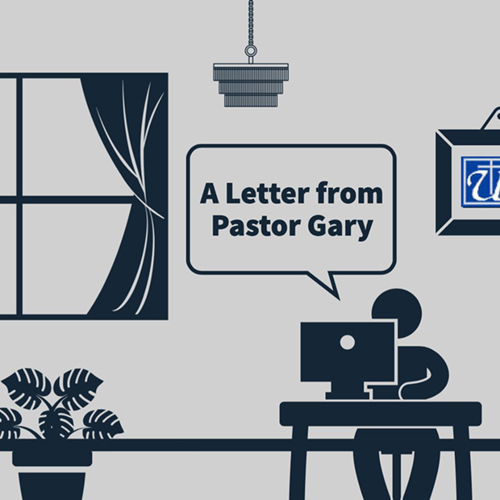
Twice I have intentionally worn robes for our online worship: Christmas Eve and Ash Wednesday. On those other occasional times you see me in my liturgical regalia, it has been because either our taping sessions were changed or I had walked right past my online clothing without taking it with me as it hung there by the door as a reminder.
Not too long ago when my forgetfulness caused another need to dawn the robe, I went to tie the cincture (church word for rope) around the robe and discovered I had forgotten how to tie it. I am of the pragmatic sort and don’t have a fancy way to tie the cincture. Some clergy have a way to make the knot using three twists or the Trinity. Others have a method where the cincture drops into a loop, creating a nice, neat look. Still others have two places…one on the right of the robe, the other on the left, with two knots. Very impressive looking! Me, leaning more to pragmatism and being all thumbs, I prefer any way as long as the cincture doesn’t come apart and fall down during worship.
Try as I might, I couldn’t remember how to do it. Something I did multiple times on a Sunday, seemed now lost to the past. Eventually I figured it out, but I took this
as an example of how this pandemic has affected so much of life. It has affected so much that was once routine and now seems to be tucked away in some forgotten past.
What “cinctures” might you have? What things of times past that you once did even daily, may have to be relearned? It can be a bit fearful knowing we may have to relearn the already learned as we get back to some resemblance of life as we once knew it. Will there be former routines at work that will require some thinking once we return to our office, classroom, or place of work? When we see youthful loved ones, will there need to be some re-acquaintance as they have grown and changed in the past year?
This is, however, the way life has always gone. We study history so we do not repeat its mistakes, yet it seems at times we more than repeat them, we actually seem mired in them. How many times we insist on relearning the already learned!
In Lent we confess more than our sins. Yet our sins are merely a symptom of a much deeper malady. In Lent, what we confess most is the very sinfulness that produces them. Talk about relearning the already learned! Yet in Lent we have the hope that we, mired in sinfulness, need not be stuck in our sins. We are often able to learn from them, repent of them, and move on into a future without them.
While many avoid the church because of all the hypocrites contained within, we who are within remain in the church because of our constantly confessed hypocrisy. We know we are those who persistently need to relearn what we have already learned.
We all are aware of 12 step programs. The church and the Christian life is a one step program lived out through a 6 step program. Step one is following Jesus. Steps 1-6 are the cycle of the church year: Advent, Christmas, Epiphany, Lent, Holy Week/Easter, Pentecost/Sundays after Pentecost. Each year we repeat. Each year we learn some new things and relearn some old.
Let your fingers stumble through your cinctures. Go ahead and learn all over what you already knew. Repetition can be a good teacher. It is not just the way of life and the way we make things a part of us, it is a way that God, through the Body of the Christ in which we participate, continues to implant faith and drive out sins as long as we need it; year after year for a lifetime, from Advent to Sundays after Pentecost. It would seem God is okay with teaching us over and over again.
